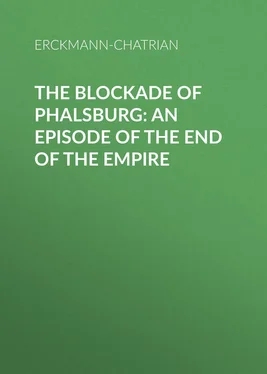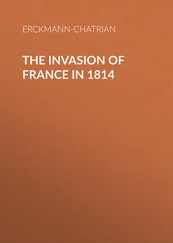Erckmann-Chatrian - The Blockade of Phalsburg - An Episode of the End of the Empire
Здесь есть возможность читать онлайн «Erckmann-Chatrian - The Blockade of Phalsburg - An Episode of the End of the Empire» — ознакомительный отрывок электронной книги совершенно бесплатно, а после прочтения отрывка купить полную версию. В некоторых случаях можно слушать аудио, скачать через торрент в формате fb2 и присутствует краткое содержание. Жанр: foreign_antique, foreign_prose, Историческая проза, на английском языке. Описание произведения, (предисловие) а так же отзывы посетителей доступны на портале библиотеки ЛибКат.
- Название:The Blockade of Phalsburg: An Episode of the End of the Empire
- Автор:
- Жанр:
- Год:неизвестен
- ISBN:нет данных
- Рейтинг книги:4 / 5. Голосов: 1
-
Избранное:Добавить в избранное
- Отзывы:
-
Ваша оценка:
- 80
- 1
- 2
- 3
- 4
- 5
The Blockade of Phalsburg: An Episode of the End of the Empire: краткое содержание, описание и аннотация
Предлагаем к чтению аннотацию, описание, краткое содержание или предисловие (зависит от того, что написал сам автор книги «The Blockade of Phalsburg: An Episode of the End of the Empire»). Если вы не нашли необходимую информацию о книге — напишите в комментариях, мы постараемся отыскать её.
The Blockade of Phalsburg: An Episode of the End of the Empire — читать онлайн ознакомительный отрывок
Ниже представлен текст книги, разбитый по страницам. Система сохранения места последней прочитанной страницы, позволяет с удобством читать онлайн бесплатно книгу «The Blockade of Phalsburg: An Episode of the End of the Empire», без необходимости каждый раз заново искать на чём Вы остановились. Поставьте закладку, и сможете в любой момент перейти на страницу, на которой закончили чтение.
Интервал:
Закладка:
"Yes," I said, "that is very true, Burguet, I am broken down – more so, perhaps, than you think."
"That is well," said he, "but go and take your musket and cartridge-box."
"And are we not going to stay in the barracks?"
"No, no!" he cried, laughing aloud, "we are going to live quietly at home."
He shook hands with me, and I went under the arch of the mayoralty. The stairway was crowded with people, and we heard names called out.
And there, Fritz, you should have seen the looks of the Robinots, the Gourdiers, the Mariners, that mass of tilers, knife-grinders, house-painters, people who, every day, in ordinary times, would take off their caps to you to get a little work – you should have seen them straighten themselves up, look at you pityingly over the shoulder, blow in their cheeks, and call out:
"Ah, Moses, is it thou? Thou wilt make a comical soldier. He! he! he! They will cut thy mustaches according to regulation!"
And such-like nonsense.
Yes, everything was changed; these former bullies had been named in advance sergeants, sergeant-majors, corporals, and the rest of us were nothing at all. War upsets everything; the first become last, and the last first. It is not good sense but discipline which carries the day. The man who scrubbed your floor yesterday, because he was too stupid to gain a living any other way, becomes your sergeant, and if he tells you that white is black, you must let it be so.
At last, after waiting an hour, some one called out, "Moses!" and I went up.
The great hall above was full of people. They all exclaimed:
"Moses! Wilt thou come, Moses? Ah, see him! He is the old guard! Look now, how he is built! Thou shalt be ensign, Moses! Thou shalt lead us on to victory!"
And the fools laughed, nudging each others' elbows. I passed on, without answering or even looking at them.
In the room at the farther end, where the names were drawn at conscriptions, Governor Moulin, Commandant Petitgenet, the mayor, Frichard, secretary of the mayoralty, Rollin, captain of apparel, and six or seven other superannuated men, crippled with rheumatism, brought from all parts of the world, were met in council, some sitting, the rest standing.
These old ones began to laugh as they saw me come in. I heard them say to one another: "He is strong yet! Yes, he is all right."
So they talked, one after another. I thought to myself: "Say what you like, you will not make me think that you are twenty years old, or that you are handsome."
But I kept silence.
Suddenly the governor, who was talking with the mayor in a corner, turned around, with his great chapeau awry, and looking at me, said:
"What do you intend to do with such a patriarch? You see very well that he can hardly stand."
I was pleased, in spite of it all, and began to cough.
"Good, good!" said he, "you may go home; take care of your cold!"
I had taken four steps toward the door, when Frichard, the secretary of the mayoralty, called out:
"It is Moses! The Jew Moses, colonel, who has sent his two boys off to America! The oldest should be in the service."
This wretch of a Frichard had a grudge against me, because we had the same business of selling old clothes under the market, and the country people almost always preferred buying of me; he had a mortal grudge against me, and that is why he began to inform against me.
The governor exclaimed at once: "Stop a minute! Ah ha, old fox! You send your boys to America to escape conscription! Very well! Give him his musket, cartridge-box, and sabre."
Indignation against Frichard choked me. I would have spoken, but the wretch laughed and kept on writing at the desk; so I followed the gendarme Werner to a side room, which was filled with muskets, sabres, and cartridge-boxes.
Werner himself hung a cartridge-box crosswise on my back, and gave me a musket, saying:
"Go, Moses, and try always to answer to the call."
I went down through the crowd so indignant that I heard no longer the shouts of laughter from the rabble.
On reaching home I told Sorlé what had happened. She was very pale as she listened. After a moment, she said: "This Frichard is the enemy of our race; he is an enemy of Israel. I know it; he detests us! But just now, Moses, do not say a word; do not let him see that you are angry; it would please him too much. By and by you can have your revenge! You will have a chance. And if not yourself, your children, your grandchildren; they shall all know what this wretch has done to their grandfather – they shall know it!"
She clinched her hand, and little Sâfel listened.
This was all the comfort she could give me. I thought as she did, but I was so angry that I would have given half my fortune to ruin the wretch. All that day, and in the night, too, I exclaimed more than twenty times:
"Ah, the scoundrel! – I was going – they had said to me, 'You may go!' – He is the cause of all my misery!"
You cannot imagine, Fritz, how I have always hated that man. Never have my wife and I forgotten the harm he did us – never shall my children forget it.
V
FATHER MOSES RECEIVES WELCOME NEWS
The next day we must answer to the call before the mayoralty. All the children in town surrounded us and whistled. Fortunately, the blindages of the Place d'Armes were not finished, so that we went to learn our exercises in the large court of the college, near the chemin de ronde at the corner of the powder-house. As the pupils had been dismissed for some time, the place was at liberty.
Imagine to yourself this large court filled with citizens in bonnets, coats, cloaks, vests, and breeches, obliged to obey the orders of their former tinkers, chimney-sweeps, stable-boys, now turned into corporals, sergeants, and sergeant-majors. Imagine these peaceable men, in fours, in sixes, in tens, stretching out their legs in concert, and marching to the step, "One — two ! One — two ! Halt! Steady!" while others, marching backward, frowning, called out insolently: "Moses, dress thy shoulders!" "Moses, bring thy nose into line!" "Attention, Moses! Carry arms! Ah, old shoe, thou'lt never be good for anything! Can any one be so stupid at his age? Look – just look! Thunder! Canst thou not do that? One — two ! What an old blockhead! Come, begin again! Carry arms!"
This is the way my own cobbler, Monborne, ordered me about. I believe he would have beaten me if it had not been for Captain Vigneron.
All the rest treated their old patrons in the same way. You would have said that it had always been so – that they had always been sergeants and we had always been soldiers. I heaped up gall enough against this rabble to last fifty years.
They in fine were the masters! And the only time that I remember ever to have struck my own son, Sâfel, this Monborne was the cause of it. All the children climbed upon the wall of the chemin de ronde to look at us and laugh at us. On looking up, I saw Sâfel among them, and made a sign of displeasure with my finger. He went down at once; but at the close of the exercise, when we were ordered to break ranks before the town-house, I was seized with anger as I saw him coming toward me, and I gave him two good boxes on the ear, and said: "Go – hiss and mock at your father, like Shem, instead of bringing a garment to cover his nakedness – go!"
He wept bitterly, and in this state I went home. Sorlé seeing me come in looking very pale, and the little one following me at a distance, sobbing, came down at once to the door, and asked what was the matter. I told her how angry I was, and went upstairs.
Sorlé reproved Sâfel still more severely, and he came and begged my pardon. I granted it with all my heart, as you may suppose. But when I thought that the exercises were to be repeated every day, I would gladly have abandoned everything if I could possibly have taken with me my house and wares.
Читать дальшеИнтервал:
Закладка:
Похожие книги на «The Blockade of Phalsburg: An Episode of the End of the Empire»
Представляем Вашему вниманию похожие книги на «The Blockade of Phalsburg: An Episode of the End of the Empire» списком для выбора. Мы отобрали схожую по названию и смыслу литературу в надежде предоставить читателям больше вариантов отыскать новые, интересные, ещё непрочитанные произведения.
Обсуждение, отзывы о книге «The Blockade of Phalsburg: An Episode of the End of the Empire» и просто собственные мнения читателей. Оставьте ваши комментарии, напишите, что Вы думаете о произведении, его смысле или главных героях. Укажите что конкретно понравилось, а что нет, и почему Вы так считаете.












